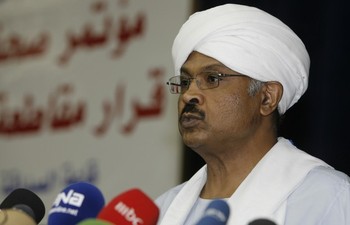Al-Fadil to narrow gaps between Sudan’s govt and opposition over peace plan
May 8, 2016 (KHARTOUM) – Opposition figure, Mubark Al Fadil, said he seeks to bridge between the internal national dialogue conference, the African Union negotiations in Addis Ababa and its “Roadmap” rejected by the opposition groups.

In a press conference he held on Sunday, he disclosed al-Fadil revealed that the national dialogue committee (7+7) proposed him, during a recent meeting with it, to join the internal process.
“But I informed them that I would not be useful for the dialogue. However It would be of great help to be a facilitator to link between the (internal) dialogue negotiations and the Roadmap Agreement proposed by the AUHIP,” he said.
“The national dialogue, which started in October, has been completed and can be considered part one (of the process), until the preparatory conference which could be the second phase of the dialogue,” he further said.
last week, NUP Secretary General, Sara Nugdalla, issued a press statement saying that al-Fadil is no longer a member of the party since he had joint the regime in 2002.
Nugalla further accused him of serving the government of President Omer al-Bashir and seeking to distort the line of the opposition party which call to review roadmap.
The NUP, SPLM-N, JEM of Girbil Ibrahim and SLM- Minni Minnawi refused last March the Roadmap Agreement. They call to hold a pre-dialogue meeting and to ensure political freedoms in the country before to join the AUHIP peace plan.
However, al-Fadil was keen to explain that his efforts are narrow the gaps between the opposition groups and the ruling National Congress Party go back to the signing of the roadmap.
“My meeting with the presidential aide, Ibrahim Mahmoud Hamid, last week was a fruit of over six months of communications,” he said.
Commenting on his meeting with Hamid, he described the presidential assistant and NCP deputy chairman as a realistic and objective politician, ”But in the end, he is not representing himself but the ruling party and his positive remarks will act as a positive catalyst for pushing things forward”.
He said he agreed with the government to create a mechanism including political forces to push for a negotiated settlement and to overcome the obstacles. Also, he announced the establishment of workshops to discuss controversial issues.
The opposition figure reiterated his support for the African Union brokered roadmap, adding that the government has responded to all the reservations expressed by the opposition.
He went to disclose that the government sent a letter to the AUHIP in response to the reservations transmitted by the opposition groups where it reiterated its commitment to implement the outcome of a meeting to be held between national dialogue body and the signatories of Paris Declaration of 8 August 2014. And that the national dialogue process will include all the opposition groups.
JEM, NUP, SLM-MM and SPLM-N said the Roadmap respond to some of their demands : the cessation of hostilities and the humanitarian access. However, it disregards the other confidence building measures included in the AU decision 539 : political freedoms, release of political detainees and prisoners and the organization of a pre-dialogue meeting including all the opposition parties.
The ”Roadmap Agreement” excludes the National Consensus Forces, a coalition of left parties, and civil society groups.
Al-Mahdi called on the opposition to accept the roadmap after the recent clarifications provided by the government, saying the political situation does not support what he called “formal delays”.
“The approval of the roadmap does not mean the signing of an agreement, but it paves the way to move forward, and whenever the opposition has felt the government’s miss-commitment it can withdraw,” he said.
Al Fadil did not rule out a popular uprising in Sudan but he warned that it could be violent and bloody, pointing to the absence of trade unions and a professional army in the country.
“There are currently nine armies in Sudan and an uprising might lead to military confrontations,” he said.
The Sudanese politician further pointed to the “positive change” that occurred with the regime saying that the military wing has taken the control of the decision-making process in the country and successfully purged the “ideologues”.
“The power has now shifted to the army, which is a national institution no matter what the circumstances are.”
(ST)
